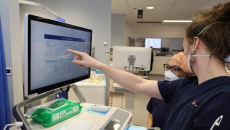Decision Support
In the first two years of the program, the health system reduced length of stay by half of a day, cut out 20,000 excess days and saved $40 million by eliminating inefficiencies.
Providers can sign up for the new Life Sciences program in Epic's electronic health record system to learn about clinical trials that might be well-suited for their patients.
A new analysis examines how artificial intelligence in medicine can impact clinical decisions and identifies the steps that could build more trust in machine learning models from doctors and patients.
By measuring the breakdown of three-dimensional bone architecture in the wrist, doctors may be better able to identify patients with osteopenia and fracture risk.
The rollout of the FIM solution seeks to improve patient safety while providing additional support to clinicians and nurses.
The eHealth NSW-developed tool provides a sepsis risk score using AI.
SPONSORED
HIMSS22 APAC
Enterprise access to all clinical information can improve clinical decision-making and support better health outcomes.
The largest gift in the cancer center's history will fund a new building and an endowed scientific leader to enhance the development of technology-enabled precision therapies.
The index uses machine learning-based similarity modeling and a data visualization tool to help compare and benchmark more than 2,000 acute care hospitals in the U.S.
Only three to four in 10 leaders are able to harness data and use AI and predictive analytics.








